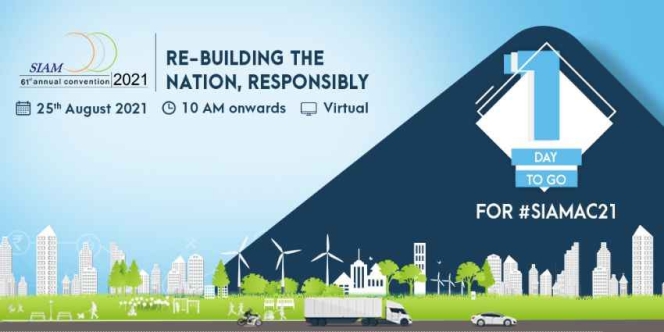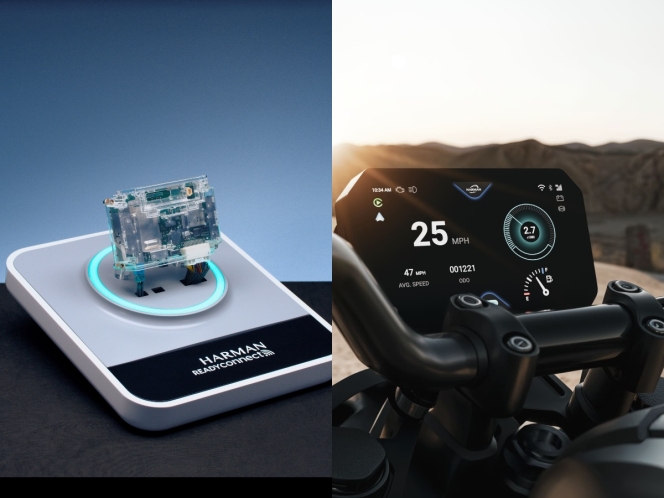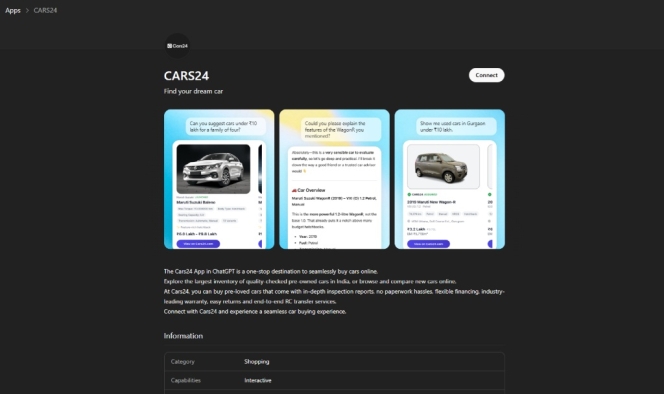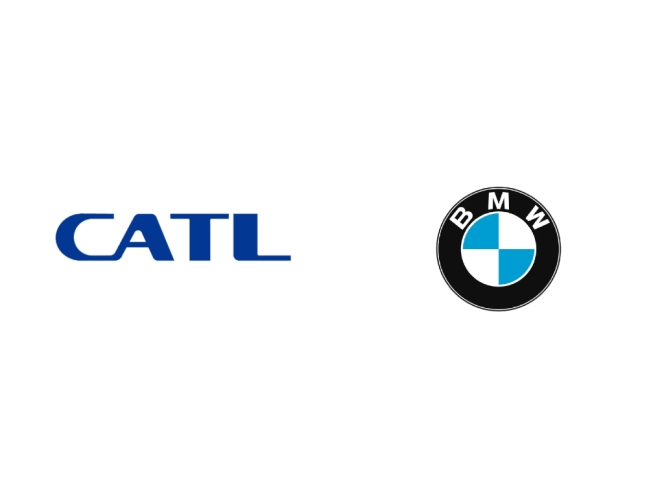61st SIAM Annual Convention
- By Bhushan Mhapralkar
- October 08, 2021

Announcing that Prime Minister Modi’s message was motivating for the Indian auto industry to work together towards new age technology, world class manufacturing, and next generation infrastructure, Kenichi Ayukawa, President, SIAM and MD & CEO, Maruti Suzuki, in his address during the opening session, said that there was a need to achieve sustainable and productive growth with quality and safety, and protect our environment, resources and raw materials. Stressing on the need for focused efforts, Ayukawa mentioned that SIAM and ACMA have together worked out a localisation roadmap with a target of about 15 to 20 percent further localisation in the next 2 to 5 years. Revealing that SIAM has prepared an approach paper for long term regulation roadmap that takes care of all aspects and gives clarity on future investments, Ayukawa San said that the auto industry is working on new powertrain technologies. He appreciated the government’s announcement of the scrappage policy and PLI scheme.

Amitabh Kant.
Recognising the contribution of the Indian automobile industry to the Indian economy, Dr Mahendra Nath Pandey, Union Minister of Heavy Industries, Government of India, said that his ministry is working consistently for the growth of the automotive sector. Acknowledging the rise in localisation supported by the PLI initiatives of government, Dr Pandey said that these efforts would make the industry more robust. He stressed on the need to develop EV charging infrastructure as well as manufacture quality products that would help the Indian automobile industry to be regarded as the best in the world. T V Narendran, President, CII and MD, Tata Steel Ltd, in his address, mentioned the need for the right policy support to make India a five-trillion-dollar economy by 2025-26. It is important that the Indian manufacturing sector is strong. He called on the auto industry to focus on six key areas – electric vehicles, circularity, urbanisation, resilient supply chain and an ability to reap in functionality and embed sustainability, going forward.

R C Bhargava.
In his speech, Amitabh Kant, CEO, NITI Aayog, said that the future direction of the auto industry is in the area of shared, connected and electric mobility. He opined that there are four prominent growth drivers that the industry should focus on. These include the expansion of investment in R&D, more focus on innovation in small format mobility segment, establishment of massive charging infrastructure across the country and provision of export impetus to the industry. Kant said that EV should be an integral part in every OEM’s plans. Road Transport Minister Nitin Gadkari spoke about the government’s aim to increase the contribution of the automotive sector towards the nation’s GDP. Currently, the sector contributes roughly 7.1 percent towards the GDP, he said. Revealing that the government would like to see the contribution rise to 12 percent, the union minister stated that it would amount to a huge step towards making India a five-trillion-dollar economy. Expressing gratitude to the dignitaries for their presence, Vipin Sondhi, Vice President, SIAM and MD, Ashok Leyland Ltd, drew attention towards the effect of Covid-19 on sales.

Appreciating the efforts of the Ministry of Heavy Industries to create world-class testing and R&D infrastructure in all the auto hubs of the country, he spoke about how the auto industry will take advantage of localisation, PLI scheme and EV charging infrastructure. These efforts, he added, will contribute to the government’s initiative of ‘Make in India’. In a session focusing on the outlook of the Indian auto industry and its role in the economic growth, Venu Srinivasan, Chairman and Managing Director, TVS Motor Company, and R C Bhargava, Chairman, Maruti Suzuki India Ltd., drew attention to the new policies introduced over the past few years. The duo stressed on the high taxation structure on automobiles and the mandatory insurance costs. These, they said, have hugely bumped up the pricing to make vehicles expensive. Srinivasan touched on two-wheelers being taxed at 28 percent despite being the most basic means of transport. This, he added, is almost equal to cars which are a luxury item. Opining that the prices of vehicles have risen over the past few years with the switch to BS IV and subsequently to BS VI, and the change in safety norms, R C Bhargava mentioned that mounting challenges have had an effect on the sales.

Venu Srinivasan.
Revenue Secretary Tarun Bajaj said that the government is open to discussing a change in Goods and Services Tax (GST) rates on automobiles. Seeking to know from the auto industry whether it is the GST rate on cars that is preventing the sector from growing, Bajaj questioned the reason behind SUV sales going up and not that of the cars in economic terms. Stating that the tax rates were higher in some states before GST came into force, he suggested the auto industry to examine in detail the reasons behind the dip in sales. Covid-19 and other factors could be at play, he reasoned. Bajaj called on the industry to keep pace with the changing technology.

Kenichi Ayukawa.
- HARMAN
- Samsung Electronics Co
- Viasat
- MWC Barcelona 2026
- Dhanaji Khade
- Sandeep Moorthy
- Snapdragon
- Shahriar Ravari
- Ready Ride
HARMAN Unveils Satellite-Enabled And Two-Wheeler Connectivity Solutions At MWC Barcelona 2026
- By MT Bureau
- March 03, 2026

HARMAN, a subsidiary of Samsung Electronics Co., Ltd., has introduced two connectivity platforms at MWC Barcelona 2026 designed to expand vehicle communications across terrestrial, satellite and two-wheeler segments.
In collaboration with Viasat, HARMAN has introduced in-cabin voice calling via satellite connectivity. The solution uses HARMAN’s Ready Connect Telematics Control Unit (TCU) and Viasat’s Mobile Satellite Services (MSS) constellation to provide communication in areas with no cellular coverage.
The system supports the 3GPP NB-NTN standard, allowing drivers to contact emergency services or roadside assistance in remote regions. The hardware utilises the Qualcomm Snapdragon Modem‑RF Gen 2 system for connectivity management. A future roadmap includes moving towards broadband satellite services to enable high-bandwidth media streaming for software-defined vehicles.
HARMAN also unveiled Ready Ride, its first end-to-end connectivity platform specifically engineered for the two-wheeler market. Powered by the Snapdragon Digital Chassis system-on-chip (SoC), the platform addresses the fact that less than 5 percent of motorcycles globally currently use telematics.
Key features of the Ready Ride platform include:
- Durability: IP69-certified sealing and rugged connectors designed to withstand dust, water ingress, and motorcycle-specific vibration levels.
- Safety and Security: Support for crash and tip-over detection, eCall functionality with a backup battery and planned features for stolen vehicle tracking and remote immobilisation.
- Rider Experience: Dual Bluetooth support and compatibility with Apple CarPlay and Android Auto to replace the need for handlebar-mounted mobile phones.
- OEM Efficiency: A scalable hardware and software stack that supports over-the-air (OTA) updates, reducing time-to-market and engineering rework for manufacturers.
Dhanaji Khade, Vice-President, HARMAN, said, “Through our collaboration with Viasat, HARMAN Ready Connect demonstrates how its satellite-enabled architecture... can extend communication beyond traditional terrestrial networks. This includes enabling voice services that facilitate immediate safety and emergency assist applications.”
Sandeep Moorthy, Senior Vice-President, Advanced Non-Terrestrial Services at Viasat, stated, “Satellite connectivity has arrived for the automotive industry. Through our collaboration with HARMAN, vehicles can now connect directly to our satellite network. That means major benefits for drivers all around the world; not only to stay safe when they’re outside of cell coverage, but to access the range of applications that space technology can bring.”
Shahriar Ravari, Ready Ride Business Lead, HARMAN, said, “Ready Ride brings our leading connectivity expertise to two-wheelers, reducing complexity with a standardised TCU foundation that helps OEMs launch faster, lower program cost, and scale confidently across regions and generations.”
Cars24 And OpenAI Partner To Integrate AI into Automotive Commerce
- By MT Bureau
- March 02, 2026

Cars24 has announced a strategic partnership with OpenAI to deploy artificial intelligence (AI) models and agents across its business operations. The collaboration focuses on embedding AI into vehicle discovery, sales, financing and post-purchase engagement across all markets where the company operates.
Unlike traditional pilot programmes, the initiative involves the integration of OpenAI’s technology into production environments to manage high-volume workflows. The partnership aims to transition the platform from manual automation to systems that assist in decision-making and data retrieval.
Cars24 has already deployed OpenAI’s Enterprise APIs across several internal and customer-facing functions. According to company data, the integration has resulted in a 50 percent increase in support resolution through assisted troubleshooting and an 80 percent reduction in turnaround time for service workflows.
Current deployment statistics include:
- Customer Outreach: AI agents now manage 20 percent of outbound conversations.
- Internal Adoption: 85 percent daily active usage of ChatGPT Enterprise among the central workforce.
- Functionality: Teams utilise the tools for data analysis, code development, and the summarisation of operational cases.
- Accessibility: The Cars24 application is now available on the ChatGPT Store for conversational vehicle discovery.
The partnership is designed to reduce dependencies on manual processes in automotive transactions. By embedding models into core workflows, the company intends to shorten decision cycles for buyers and sellers. Future phases of the rollout will include expanding these AI experiences to additional languages and product lines.
Vikram Chopra, CEO and Founder, Cars24, said, “Automotive commerce is operationally heavy by nature with multiple checkpoints, fragmented information and high-consideration decisions. Over time, we’ve realised that incremental improvements aren’t enough; the system itself needs to become more intelligent. Our collaboration with OpenAI is a step in that direction. By embedding AI into core workflows rather than layering it on top, we can reduce manual dependencies, improve consistency and shorten decision cycles. We don’t see this as a short-term advantage, but as foundational infrastructure that will compound in efficiency and trust over the years.”
- Tata Technologies
- WITTENSTEIN High Integrity Systems
- WHIS
- Andrew Longhurst
- Software Defined Vehicle
- SDV
- Nachiket Paranjpe
Tata Technologies Partners WHIS To Advance SDV Development
- By MT Bureau
- March 02, 2026

Tata Technologies has announced a partnership with WITTENSTEIN High Integrity Systems (WHIS) to accelerate the development of Software-Defined Vehicles (SDVs). The collaboration involves integrating WHIS’s SAFE RTOS into Tata Technologies’ automotive software stack.
The integration is designed to assist original equipment manufacturers (OEMs) and Tier 1 suppliers in meeting functional safety standards, such as ISO 26262. The partnership focuses on the transition towards connected, autonomous, and electrified mobility by providing safety-certified architectures for complex vehicle ecosystems.
SAFE RTOS provides real-time performance and reliability, serving as a component within the Tata Technologies SDV platform. This allows for the development of software architectures that support the increasing centrality of software in vehicle design.
The partnership combines Tata Technologies' experience in automotive software with WHIS's embedded software solutions to address requirements for scalable and certified systems.
Andrew Longhurst, Managing Director, WITTENSTEIN High Integrity Systems, said, “Software is at the heart of the automotive industry’s evolution. Our partnership with Tata Technologies ensures that OEMs and Tier 1 suppliers can leverage SAFE RTOS to achieve the highest levels of safety and performance in their software-defined vehicle architectures.”
Nachiket Paranjpe, President – Automotive Sales, Tata Technologies, added, “By combining Tata Technologies’ expertise in automotive software development with WHIS’s proven safety solutions, we are empowering our customers to accelerate SDV adoption and deliver cutting-edge mobility experiences.”
CATL And BMW Sign Agreement On Battery Passport And Decarbonisation
- By MT Bureau
- March 01, 2026

CATL and the BMW Group have signed a Memorandum of Understanding (MoU) to expand cooperation on battery supply chain data exchange and decarbonisation. The agreement was finalised in Beijing during a visit by a German delegation including Chancellor Friedrich Merz.
The partnership focuses on pilot projects for cross-border data transfer under the Battery Passport framework. The companies will collaborate on carbon accounting methodologies and tools to calculate the carbon footprints of power batteries.
The initiative utilises Catena-X, a standardised automotive data ecosystem, to align technical standards and policy frameworks. By testing Battery Passport applications, CATL and BMW aim to meet China-EU regulatory requirements and establish global data standards for the battery industry.
The cooperation is intended to improve digital management and ensure compliance with EU market access regulations regarding green product competitiveness.
The strategic relationship between CATL and BMW began in 2012. Previous collaborations have covered battery production, research and development and supply chain sustainability. This MoU shifts the partnership from product-level cooperation to institutional coordination for electric mobility.
CATL stated its intention to continue cooperation with international partners to use technology for the global energy transition and the sustainability of the automotive sector.






Comments (0)
ADD COMMENT